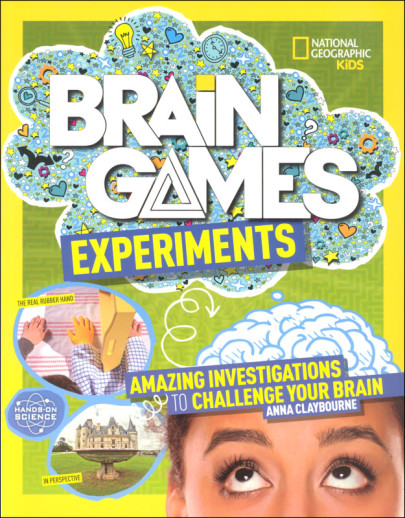We use cookies to make your experience better. To comply with the new e-Privacy directive, we need to ask for your consent to set the cookies. Learn more.
Brain Games: Experiments (National Geographic Kids)
Brain games are fun activities, games, and tests to try out on your brain, or your friends’ and family’s brains! They reveal all kinds of cool stuff about how the brain works, what it does without you even realizing, and what it’s good at and not so good at. You’ll also find out how you can trick and confuse your brain, and how to help it do tasks more easily, too. This book has four chapters, each containing a selection of brain games to try. Most of them don’t need much equipment: just a few everyday household objects. There are outdoor and indoor brain games, and some can be done anywhere.
Disclaimer: Various steps in some of the activities in this book involve potential risk of personal injury, property damage, and other dangers associated with the use of sharp objects, food, blindfolds, and/or other materials. By performing and/or allowing your child to perform any activities presented in this book, you, (1) assume all risks of damage or injury to any person or property as a result of your and/or your young scientist’s performance of the activities: and (2) acknowledge that the author and publisher disclaim all responsibility and liability for any damage or injury that may result from your and/or your young scientist’s performance of the activities. 96 pgs, pb. ~Amber
These fun and educational activity books show some of the cool and unique things our brains can do. Learn about why people recognize faces better than names, how words can still be read after removing many of the letters, how heavily we depend on our senses, how memories are linked to specific pictures, how our emotions affect us, and so much more! There are several books in this intriguing series, all having a different number of pages, activities, and topics. These make great travel or summer activity books! ~ Brianna
| Product Format: | Paperback |
|---|---|
| Brand: | National Geographic Kids |
| Grades: | 3-7 |
| ISBN: | 9781426372520 |
| Length in Inches: | 10.875 |
| Width in Inches: | 8.5 |
| Height in Inches: | 0.3125 |
| Weight in Pounds: | 0.9 |

